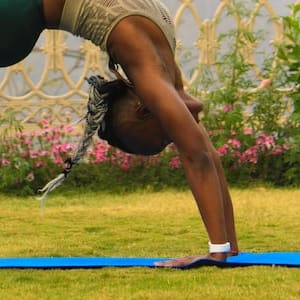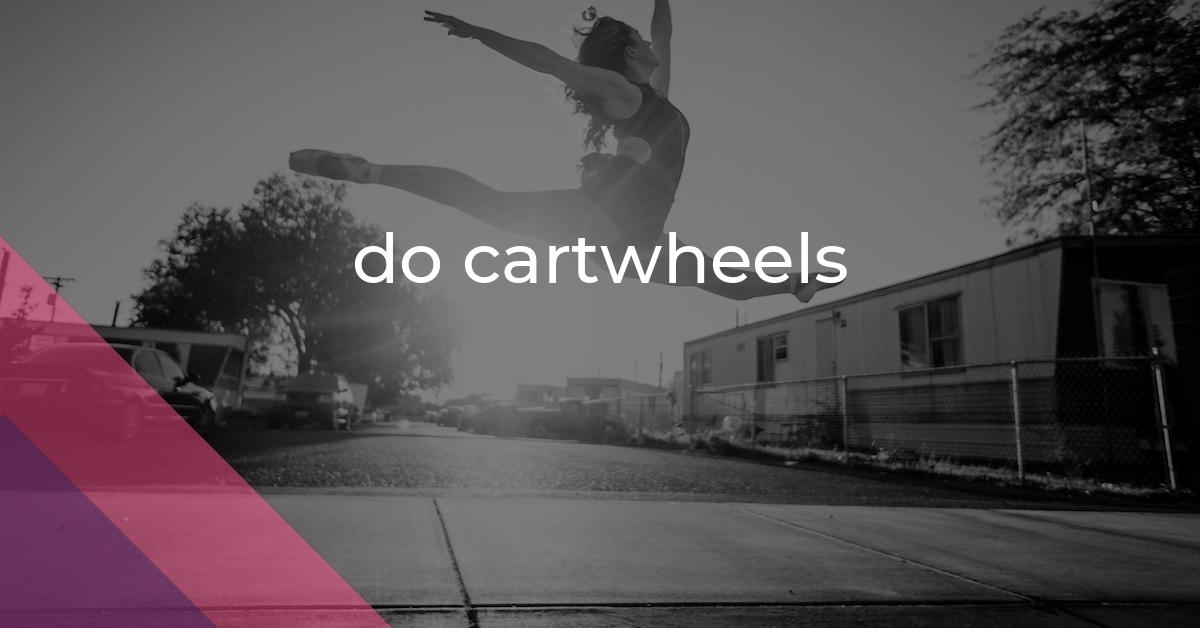do cartwheels: Idiom Meaning and Origin
What does ‘do cartwheels’ mean?
The idiom "do cartwheels" means to express extreme joy or excitement, often by physically performing the acrobatic movement of cartwheels. It conveys a sense of exuberance and celebration.

Idiom Explorer
The idiom "kick up one's heels" means to relax, have fun, or engage in lively enjoyment and uninhibited behavior.
The idiom "jump through hoops" means to go to great lengths or make a considerable effort to achieve or satisfy someone's demands or expectations.
An idiom meaning to do something quickly and efficiently, often describing the completion of multiple tasks or actions in a single swift and decisive motion.
An idiom used to describe someone who is in an emotional or mental state of extreme agitation, distress, or confusion.
The idiom "horse around" means to engage in playful, often rowdy or foolish behavior. It is used to describe someone who is not taking a situation seriously or wasting time by being silly or disruptive.
The idiom "head-spinningly" implies something that is incredibly fast, overwhelming, and causes confusion or disorientation.
The idiom *head-spinning* means something that is extremely fast, overwhelming or confusing to the mind.
The idiom "have a good time" means to enjoy oneself or to have an enjoyable experience.
The idiom "have a ball" means to have a great time or enjoy oneself immensely.
Gravity-defying gymnastics
The idiom "do cartwheels" is a commonly used phrase in the English language with a specific meaning.
The phrase "do cartwheels" is an idiomatic expression that originated from the literal act of performing gymnastic cartwheels.
It is used to describe an exuberant or joyful display of excitement, typically in response to good news or a favorable outcome.
She performed flawless cartwheels, showcasing her physical movement skills in gymnastics.
The idiom is often used in informal contexts and is recognized as a figurative way to convey a sense of happiness or celebration.
The origins of the idiom are closely tied to the physical motion of performing cartwheels, which involve rotating one's body horizontally in a circular motion, typically with the hands on the ground for support.
The idiom's usage extends beyond the literal act of performing cartwheels and has become a metaphorical expression signaling delight or jubilation.
She did cartwheels when she heard the news.
The phrase "do cartwheels" can be used in various sentence structures, such as "She did cartwheels when she heard the news" or "I'll be doing cartwheels if we win the game."
In addition to its literal meaning, "do cartwheels" is related to several idiomatic expressions that convey a similar sense of excitement and joy.
In situations where someone wants to express extreme joy or celebrate a positive outcome, they might use the idiom "jump for joy". This expression represents an exuberant display of happiness and excitement, similar to "do cartwheels". For example, if someone receives good news, they might jump for joy or even do cartwheels to express their elation.
Another related idiom is "go wild". This phrase is used to indicate a state of unrestrained excitement or enthusiasm. When someone "goes wild", they are exhibiting a level of high energy and exuberance, just like someone who is doing cartwheels. The idiom "go wild" can be used interchangeably with "do cartwheels" to convey a similar sense of joy and celebration.
"Have a ball" is yet another idiom that is closely related to "do cartwheels". This expression is used to describe a situation where someone is thoroughly enjoying themselves and having a great time. When someone "has a ball", they are experiencing a sense of fun and delight, similar to the elation conveyed by "do cartwheels". Both idioms capture the essence of happiness and excitement.
The idiom "bounce off the walls" is another expression that shares a similar meaning to "do cartwheels". When someone is "bouncing off the walls", they are exhibiting extreme excitement or restlessness. This heightened level of energy and enthusiasm mirrors the exuberance conveyed by someone who is doing cartwheels. Whether someone is literally bouncing off walls or figuratively doing cartwheels, both idioms capture the idea of uncontainable joy and exuberance.
The adverb "head-spinningly" can be used in conjunction with "do cartwheels" to intensify the sense of joy and excitement. When someone experiences something "head-spinningly" enjoyable, they are overwhelmed with happiness to the point where it feels like their head is spinning, just as someone might feel while doing cartwheels. This adverb adds emphasis and enhances the emotional impact of the phrase "do cartwheels", allowing for a more vivid and expressive portrayal of exuberance.
"do cartwheels" is a widely recognized idiom within the English language. Its origins can be traced back to the physical act of performing cartwheels, which eventually evolved into a metaphorical expression conveying extreme joy or happiness. The idiom's versatility allows it to be used in a variety of contexts, offering individuals a concise and vivid way to express exuberance. Whether someone is jumping for joy, going wild, having a ball, bouncing off the walls, or experiencing something head-spinningly enjoyable, the idiom "do cartwheels" captures the essence of elation and delight.
Example usage
Examples of how the idiom *do cartwheels* can be used in a sentence:
- I was so excited when I heard the news that I did cartwheels in the backyard.
- She did cartwheels down the beach, enjoying the freedom and carefreeness of childhood.
- When my favorite team won the championship, I couldn't help but do cartwheels of joy.
More "Expression" idioms



